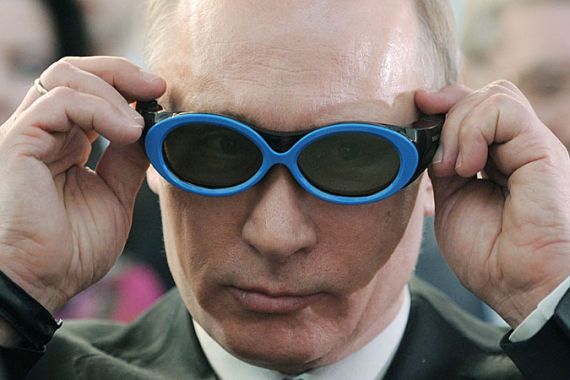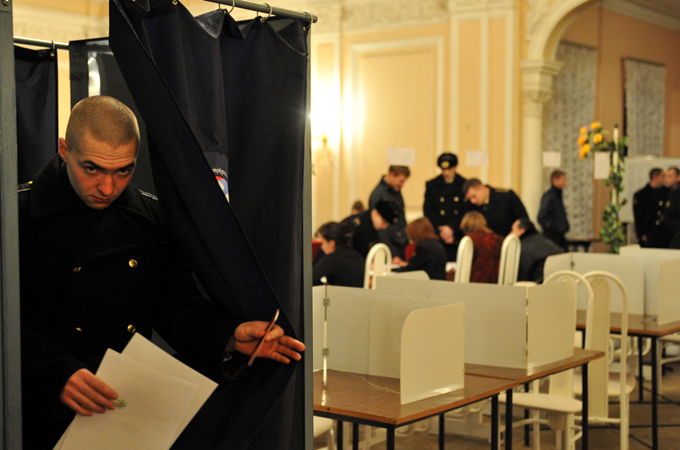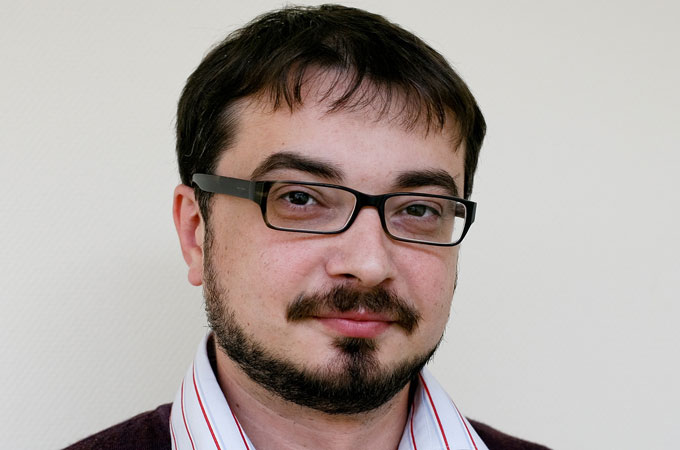Russia gears up for ‘dirty campaign’
With little changed since December’s disputed poll, the advantages appear stacked in favour of a Putin presidency.

 |
| December’s election proved to be the most contentious in Russia’s post-Soviet history [AFP] |
Dmitri Surnin, an election observer at Moscow’s precinct 1701 polling station, finished his day’s work on the night of December 4 having registered that the ruling United Russia party had lost to the Communist party by 285 to 271, a margin of 14 votes.
The next day, having taken his personal copy of the totals home with him, he checked the official election website for the country’s parliamentary election which showed that United Russia had taken 662 votes against 295 for the Communist party.
Speaking to Al Jazeera, Surnin said: “I was shocked by the fact how blatant the fraud was. I had spent the whole election day warding the polling station, writing complaints, stopping illegal voting, and in the end left with a feeling that we managed to have a fair count.
“And in the morning I discovered that they simply changed the numbers. I was made feel like an idiot. I was outraged.
Surnin’s is just one example of the widespread allegations of fraud and vote-rigging in an election that proved to be the most contentious in the country’s post-Soviet history.
Ahead of March’s presidential poll, in which Vladimir Putin is running for a third term in office, thousands of Russians have taken to the streets demanding fair and free elections, with many fearing a repeat of the incidents in next month’s poll.
Tactics allegedly used in December to help secure victory for Putin’s United Russia party included intimidation of the country’s only independent election watchdog, the mysterious blocking of opposition websites during the election weekend, widespread allegations of ballot rigging and the prevention of many parties from standing in the first place.
In its report into the poll, an election monitoring team from the Parliamentary Assembly Council of Europe (PACE), said that the election was “marked by a convergence of the state and the governing party, limited political competition and a lack of fairness”.
“Parties in some regions filed formal complaints about seizure of campaign materials, unequal access to billboard space and undue restrictions on the right to hold rallies,” it said.
“Thus, the playing field was slanted in favour of United Russia.”
Looking ahead to March, all the advantages still appear stacked in Putin’s favour.
Media domination
Putin, who has held the office of prime minister since 2008 because he was constitutionally barred from running for a third consecutive term as president, has predicted a dirty campaign.
Asked at regional conference of United Russia in Yekaterinburg last summer about what he would do once the presidential election was over, he said: “I shall go and have a wash, in the hygienic sense of the word, but also in the political sense.
 |
| Russia has witnessed the biggest ant-Kremlin protests since the fall of Communism [GALLO/GETTY] |
“After all, the campaigns which we will have to go through, we will need to busy ourselves with hygiene.”
One of the most powerful weapons used by the Kremlin, particularly during election campaigning, is its dominance of the media.
After first coming to power as president in 2000, Putin gradually imposed state control over all national television stations.
Putin enjoys a virtual monopoly of support on television. The opposition, both in December and ahead of March’s poll, often has only online sources to promote its message.
Speaking a day after the December 4 vote, Petros Efthymiou, an official from the Organisation for Security and Co-operation in Europe (OSCE), which monitored the vote, said: “The contest was also slanted in favour of the ruling party … most media were partial.”
One of the few sources of criticism of Putin outside of the internet is through Ekho Moskvy (Echo of Moscow), Russia’s oldest independent radio station, which has provided full coverage of the anti-government protests that began in December.
On February 14, less than three weeks before March’s presidential vote, Alexei Venediktov, the editor, said the station’s board was being changed in an effort to curtail criticism of the government ahead of the March poll.
The station is two-thirds controlled by the gas giant Gazprom but Venediktov had, up until now, retained full editorial independence over its output.
The move to change the board follows comments by Putin that the station was serving the interests of US foreign policy and “pouring diarrhoea” on him all day.
In a statement posted on Ekho Moskvy’s website, Venediktov said that its journalists were “bewildered” by the sudden changes and that the move was almost certainly political revenge.
Cyber attacks
On the weekend of the December election, Ekho Moskvy, Golos, the country’s only independent electoral watchdog, and several other organisations were the victims of massive cyber-attacks.
The website of Ekho Moskvy only became available again once polls had closed.
Speaking on Twitter at the time, Venediktov said: “The attack on the website on election day is clearly an attempt to inhibit publication of information about violations.”
Ahead of the vote, Golos ran a hotline for allegations of electoral violations and launched an interactive map on its website showing reported violations.
On polling day, the organisation said its main website as well as the website ”Map of Violations” were under ”massive DDoS [distributed denial of service] attacks”.
The website of New Times, an opposition weekly which publish investigations exposing corruption by government officials, was also down for several hours on the Sunday of the poll.
Activists argue that the scale and professionalism of the hacking means it must be state-sponsored and some fear a repeat ahead of March’s poll.
On the eve of the December vote, Liliya Shibanova , the head of Golos, was held by customs officers at Sheremetyevo airport and her laptop confiscated after returning from a trip abroad.
Shibanova, who was held for 12 hours, was told her computer was being examined on the grounds that it could contain “material dangerous for national security”.
Last month, Golos was told by its landlord to leave its offices or expect continual power failures until March 6, strongly affecting the group’s ability to monitor the presidential election.
Rigging
In the final results of December’s poll, United Russia won the election with 49 per cent of the vote, taking 238 seats or 53 of the seats in the Duma, the country’s lower parliament.
 |
| Surnin poins out that the use of web cameras does not prevent anyone from simply changing the numbers |
The result was significantly down from the party’s 2007 showing in which it took 64 per cent of the vote and 70 per cents of the seats.
Perhaps the most serious accusations during the election were allegations of widespread vote-rigging.
PACE said vote counting “was characterised by frequent procedural violations and manipulations, including ballot-box stuffing”.
There were allegations that people had been paid to vote for United Russia and that people had voted in different polling stations in a practice known as “carousel” voting.
Under the practice, voters were allegedly bused around to various polling stations to repeatedly vote for United Russia.
Two weeks after the elections, Putin instructed web cameras to be installed at all polling stations. “The maximum task is to equip 100 per cent of the polling places with web cameras,” said Putin.
The cost of the implementation across the vast country has been put at between $500m and $1bn.
Many activists have dismissed the move, invoking the phrase widely attributed to Joseph Stalin, the former Russia leader, that: “It’s not the people who vote that count, it’s the people who count the votes.”
Surnin said: “Installation of the web cams is better than nothing, but it doesn’t prevent anyone from simply changing numbers. Most of the violations can’t be caught on camera due to their nature.
”But there will be more observers and more of them with good experience. So there is a good chance that less votes will be stolen, simply because more people will be trying to prevent that.”
Commission criticised
Despite the widespread allegations of vote-rigging, Vladimir Churov, the head of the country’s Central Electoral Commission (CEC), told Russkaya Sluzhba Novostei radio on February 15 that no proof has been found that carousel voting had taken place.
Probes into the practice, and other ballot-stuffing operations, known as “the carousel,” have not turned up any proof, Churov said.
In fact, much of the biggest criticism of the elections has been directed at Churov and the CEC
In their final report into the December elections, PACE criticised the CEC from stopping several parties from running in the first place.
 |
| Much of the biggest criticism of the elections has been directed at Churov [GALLO/GETTY |
It wrote: “Although seven political parties ran, which created the possibility of real political competition, the prior denial of registration to certain parties by the Ministry of Justice narrowed political competition.”
Ahead of March’s poll, with no less than 11 candidates have been prevented from standing on a range of technicalities, reducing the field to just five candidates.
Dmitry Medvedev, the Russian president, has announced a comprehensive reform of the Russian political system, including simplification of the rules governing the registration of political parties, but the changes will only be implemented after March’s vote
In its report, PACE wrote: “Representatives of most political parties expressed a high degree of distrust in the impartiality of election commissions at all levels and questioned their independence from various state administration bodies.
“Any election needs an impartial referee and, to this day, this is clearly missing in the Russian Federation.”
Speaking to Al Jazeera, Tiny Kox, the head of the PACE monitoring team for the December elections, and who will also monitor the March poll, said the fact that Churov had become such a high-profile person in itself pointed to problems with the electoral system.
He said: “The fact that the name of the head of the central election committee [Churov] is on so many banners in demonstrations is not a good sign.
“In my country, the Netherlands, nobody knows who is the head of the CEC and that is good because that shows that … the CEC should be beyond any doubt of their impartiality.”
‘Same people’
Noting the protests that have taken place since December, Kox said there was now “a mood of change in the country”.
”We have seen many demonstrations in Moscow, throughout the country, where people go out to the streets and say that they now want their free and fair presidential elections,” he said.
Whether a mood of change is enough to tackle the apparent deep-seated unfairness unherent in Russia’s political system seems doubtful.
Most activists and protesters believe a Putin victory is a foregone conclusion.
As Surnin puts it: “I don’t expect the elections to be any fairer, as they are organised by the same people.”